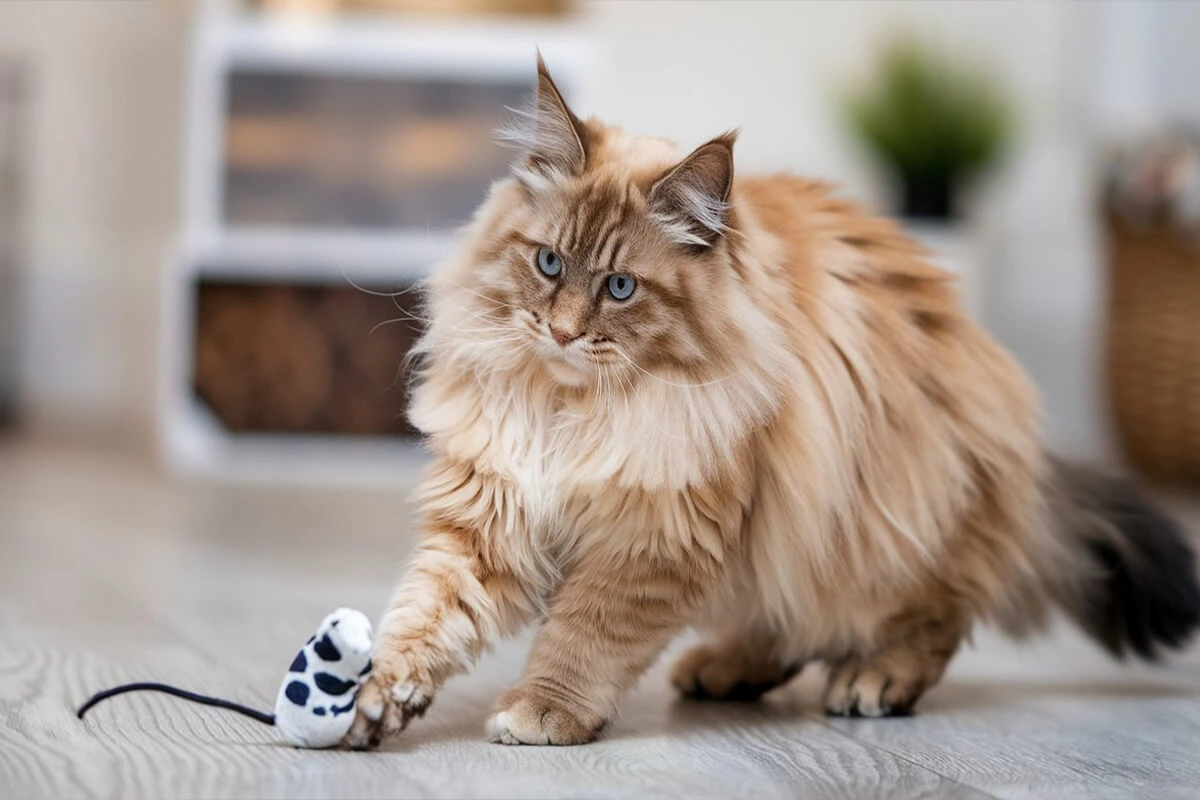Maine Coon cat price varies widely, and understanding the factors behind the cost can help you make an informed decision. As one of the most popular and largest domestic cat breeds, the Maine Coon attracts buyers looking for a friendly, majestic feline companion. However, the price tag isn’t just about purchasing the cat—ongoing expenses like veterinary care, food, grooming, and insurance add to the total cost of ownership.
If you’re considering bringing a Maine Coon into your home, you need to know what influences the price, whether you’re buying from a breeder or adopting. Some factors, like pedigree and breeder reputation, significantly impact the initial cost, while others, such as healthcare and grooming, affect long-term expenses. This guide will break down the top 10 price factors, helping you understand what to expect before making a purchase.
The Base Price: Maine Coon Kitten vs. Adult Cat
Maine Coon Kitten Price vs. Adult Cat
Maine Coon kittens usually cost more than adult cats because demand for kittens is higher. Many buyers prefer raising their cat from an early age, which increases the price breeders charge. Kittens from reputable breeders typically range from $1,000 to $3,500, depending on pedigree and location. Show-quality kittens with champion bloodlines fall on the higher end of the spectrum, while pet-quality kittens cost slightly less.
Adult Maine Coons, especially retired breeding cats, often cost less than kittens. Many breeders rehome retired cats for a lower fee, usually between $500 and $1,500. Older cats may already have vaccinations and health screenings, reducing initial veterinary costs. However, their temperament and habits are already formed, which may not suit every owner’s preference.
Pedigree and Bloodline Influence
A Maine Coon’s pedigree significantly impacts its price. Cats with championship bloodlines, known for their exceptional size, coat quality, and breed-standard features, often cost more. Breeders who specialize in show-quality Maine Coons invest in careful breeding practices, genetic testing, and high-quality care, which raises the price.
Registered Maine Coon cats with documentation from organizations like The International Cat Association (TICA) or the Cat Fanciers’ Association (CFA) often come at a premium. These pedigreed cats provide assurance of breed purity, which is essential for buyers looking for a traditional Maine Coon appearance and temperament. If you’re only looking for a companion pet, a Maine Coon without a show-quality pedigree might be a more affordable option.
Breeder Reputation and Quality
The breeder you choose plays a significant role in the price and quality of your Maine Coon. Ethical breeders invest time and money into raising healthy, well-socialized kittens. They provide proper veterinary care, genetic testing, and socialization, all of which contribute to the higher cost. A reputable breeder typically charges between $1,500 and $4,000 per kitten, depending on bloodline and location.
On the other hand, backyard breeders or kitten mills may offer Maine Coon kittens at a lower price, often between $500 and $1,000. However, these breeders often cut corners on essential health screenings, vaccinations, and socialization. Kittens from these sources may have a higher risk of genetic disorders or behavioral issues, leading to higher long-term costs in veterinary bills and training.
To find a reputable breeder, look for TICA- or CFA-registered breeders, check online reviews, and ask for references. A good breeder will be transparent about their breeding practices, provide health guarantees, and allow you to visit their cattery or provide detailed information about the kitten’s upbringing.
Adoption vs. Buying from a Breeder
Maine Coon Adoption Cost
Adopting a Maine Coon costs significantly less than buying from a breeder. Most adoption centers and rescue organizations charge between $100 and $500, depending on the cat’s age, health, and location. Some shelters offer lower fees during adoption events or if the cat has been in the shelter for an extended period.
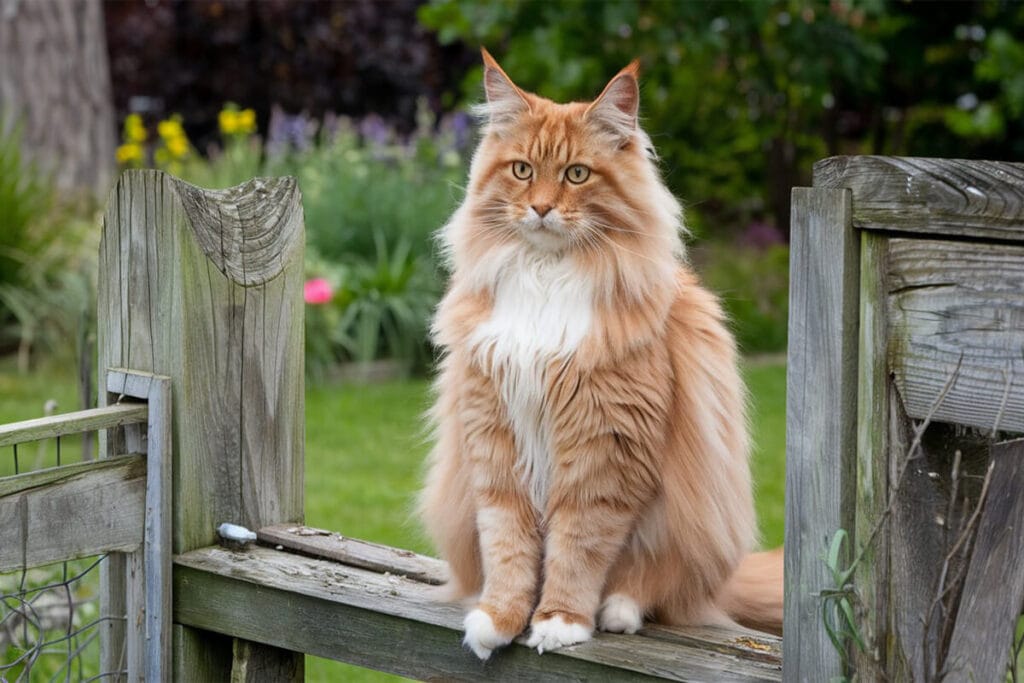
Adopted Maine Coons often come with vaccinations, spaying or neutering, and microchipping included in the adoption fee. These services can save you hundreds of dollars in initial veterinary expenses. However, finding a purebred Maine Coon in a shelter can be challenging because they get adopted quickly. Some rescues specialize in Maine Coons, but availability remains limited, and you may need to join a waiting list.
Cost of Buying from a Breeder
Buying a Maine Coon from a breeder costs more, but you get a cat with a known history, predictable traits, and health guarantees. Prices typically range from $1,000 to $4,000, depending on the breeder’s reputation, the cat’s pedigree, and whether the kitten is pet-quality or show-quality.
Breeders charge higher prices because they invest in genetic testing, high-quality nutrition, veterinary care, and socialization from an early age. Many reputable breeders provide contracts that include health guarantees and return policies in case the buyer can no longer care for the cat.
Kittens with champion bloodlines or rare colors (such as silver, smoke, or polydactyl Maine Coons) usually cost more. In contrast, pet-quality Maine Coons with minor deviations from breed standards, like a smaller size or different markings, cost slightly less but still come from responsible breeding programs.
Pros and Cons of Each Option
| Factor | Adoption | Buying from a Breeder |
|---|---|---|
| Cost | $100–$500 | $1,000–$4,000 |
| Health History | Unknown or limited | Full health screening and genetic testing |
| Availability | Hard to find a purebred | Readily available through breeders |
| Age | More adult cats available | Kittens and young cats available |
| Support | Little to no breeder support | Ongoing support from the breeder |
Adopting costs less and gives a cat in need a home, but finding a purebred Maine Coon can be difficult. Some rescue cats may have unknown health issues or behavioral challenges due to past neglect. If you’re set on a purebred Maine Coon with a known pedigree, buying from a breeder ensures you get the breed’s signature traits, but it comes at a much higher price.
If preferring cost savings and giving a cat a second chance, adoption makes a great option. Or If you want a kitten with a documented lineage and health history, purchasing from a responsible breeder provides more certainty in the long run.
Essential Ownership Costs Beyond the Purchase Price
Taking care of a Maine Coon cat is about more than just paying money to buy or adopt one. Their large size, thick coat, and specific health needs require ongoing expenses that add up over time. Understanding these costs helps you budget for long-term care and ensures your cat stays healthy and happy.
Veterinary Costs
Maine Coons need regular veterinary care to maintain their health. Annual check-ups, vaccinations, and parasite prevention cost between $200 and $500 per year. Routine exams allow veterinarians to catch potential health issues early, which can save you from expensive treatments later.
Maine Coons have a higher risk of developing genetic conditions like hip dysplasia, hypertrophic cardiomyopathy (HCM), and polycystic kidney disease (PKD). If your cat develops a chronic condition, ongoing treatments can cost $500 to $2,000 per year. Emergency vet visits or surgeries, such as treating a urinary blockage or dental extractions, can range from $1,000 to $5,000, depending on the severity of the issue.
Many Maine Coon owners invest in cat insurance, which helps cover unexpected medical costs. Monthly premiums range from $20 to $50, depending on the coverage plan and your cat’s age. Choosing a policy that covers hereditary conditions can save you thousands in the long run.
Food and Nutrition
Maine Coons need a high-quality diet to support their large size and muscular build. Because they weigh between 12 and 25 pounds, they eat more than the average cat. Owners should expect to spend $40 to $100 per month on premium cat food, depending on the brand and type of diet.
A proper diet includes high-protein, grain-free kibble or wet food to support muscle health and energy levels. Many owners also supplement with raw or freeze-dried food to provide additional nutrients. Avoid cheap, low-quality foods with fillers like corn and soy, as they can lead to weight gain and digestive issues.
Maine Coons are prone to obesity if they overeat or eat poor-quality food. Portion control and scheduled feeding help maintain a healthy weight. Some owners choose automatic feeders to regulate portions, which can cost $50 to $150, but they help prevent overeating.
Grooming Expenses
Maine Coons have long, thick fur that requires frequent grooming to prevent mats and tangles. Owners should brush their cat at least three to four times a week to reduce shedding and hairballs. Investing in a high-quality slicker brush ($10 to $30) and a metal comb helps keep their coat smooth and tangle-free.
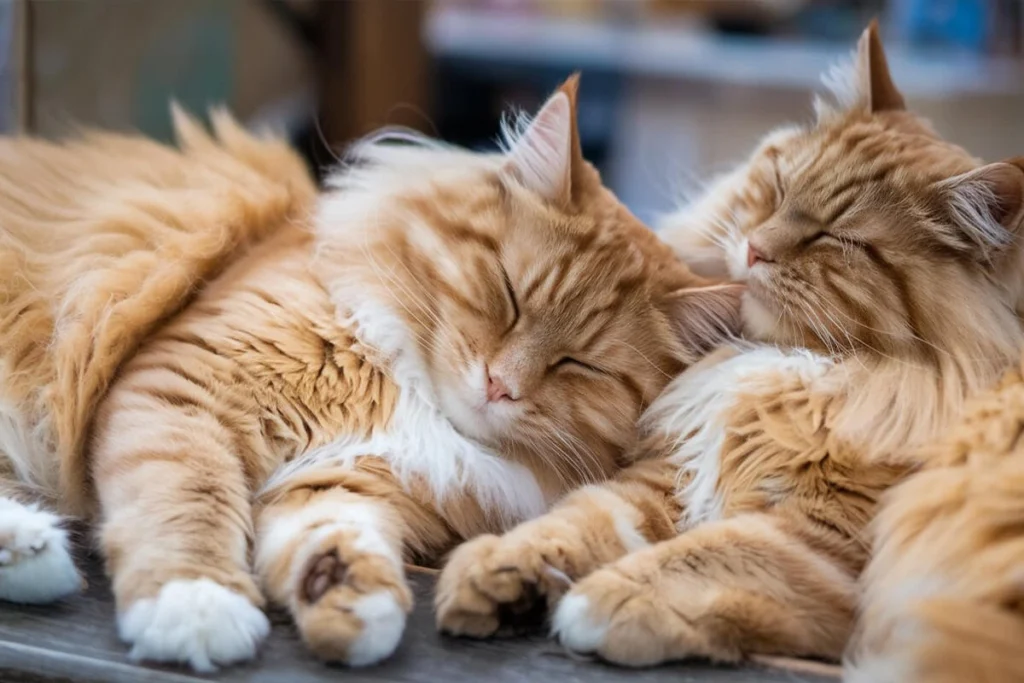
Many Maine Coon owners take their cat to a professional groomer for deep brushing, trimming, and bathing. Grooming services range from $50 to $100 per session, depending on location and services included. Cats that don’t tolerate brushing at home may need grooming appointments every six to eight weeks, which adds up to $300 to $600 per year.
Other grooming costs include:
- Nail trimming: Monthly trims cost $10 to $20, or you can buy clippers for $10 to $25.
- Ear cleaning: Maine Coons produce more earwax than some breeds, so cleaning supplies cost $10 to $15 per bottle.
- Bathing: Some Maine Coons tolerate baths, but using a cat-friendly shampoo ($10 to $20) keeps their coat clean without stripping natural oils.
Proper grooming not only keeps their coat beautiful but also prevents skin infections and hairballs. Regular maintenance at home reduces professional grooming costs and keeps your Maine Coon looking its best.
Additional Expenses That Affect the Total Cost
Owning a Maine Coon involves more than just food and veterinary care. These large, intelligent cats require plenty of space, enrichment, and occasional boarding when you travel. Investing in insurance can also help you manage unexpected medical expenses. Understanding these costs will help you budget for a happy and healthy life with your Maine Coon.
Cat Insurance
Maine Coons are prone to hereditary health conditions, making cat insurance a smart investment. Many owners choose insurance to offset potential veterinary costs, especially for serious conditions like hypertrophic cardiomyopathy (HCM), hip dysplasia, and kidney disease.
Monthly premiums range from $20 to $50, depending on coverage, deductible, and your cat’s age. Plans with accident-only coverage cost less, but they won’t cover chronic conditions or hereditary diseases. Comprehensive plans that include illness, accidents, and wellness care cost more but offer better financial protection.
Without insurance, emergency veterinary treatments can be extremely expensive.
- Emergency surgery for intestinal blockage: $2,000 – $5,000
- HCM treatment (lifelong heart medication and tests): $500 – $2,000 per year
- Hip dysplasia treatment (surgery or therapy): $1,500 – $7,000
If you don’t want insurance, setting aside $500 to $1,000 per year in a pet emergency fund helps cover unexpected costs. However, insurance provides peace of mind by covering major expenses that could otherwise strain your budget.
Living Space and Accessories
Maine Coons are one of the largest domestic cat breeds, so they need a spacious environment to thrive. Small apartments can feel cramped for these active cats, making them better suited for homes with more room.
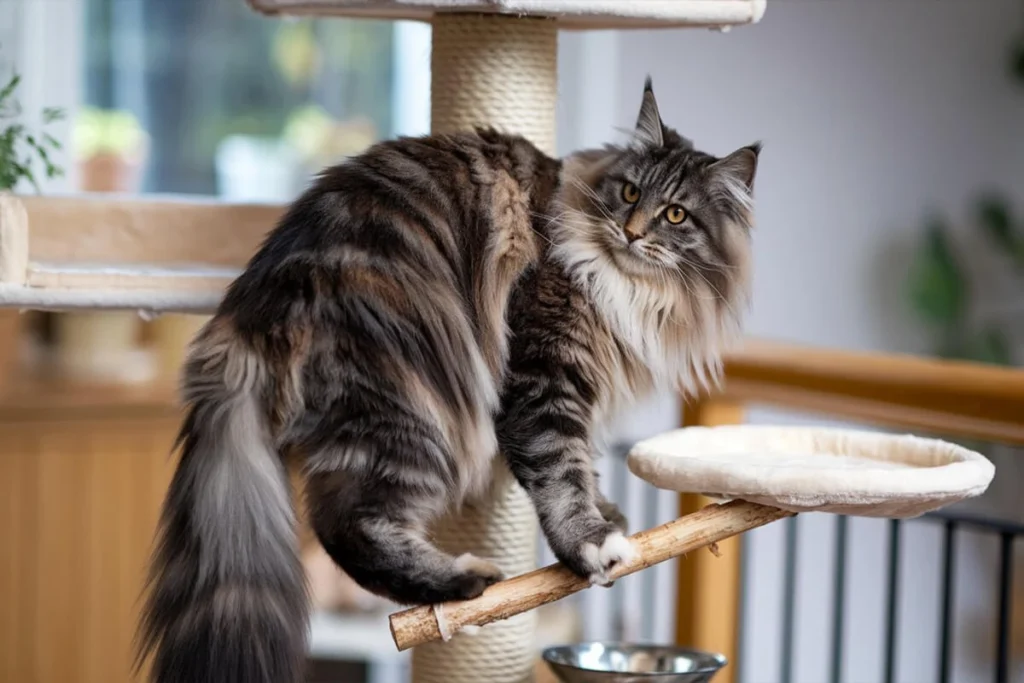
Owners should invest in large, sturdy cat furniture that supports their size and weight.
- Extra-large cat tree: Standard cat trees won’t hold a Maine Coon’s weight, so a heavy-duty model costs $150 – $500.
- Oversized litter box: Maine Coons need jumbo or high-sided litter boxes, costing $30 – $70 each.
- Heavy-duty scratching posts: Durable posts prevent furniture damage and cost $40 – $100.
- Spacious pet bed: Maine Coons love lounging, so an extra-large, cushioned bed costs $30 – $80.
Maine Coons also need plenty of enrichment to prevent boredom. Interactive toys like puzzle feeders, robotic mice, and climbing shelves keep them entertained. These toys range from $10 to $100, but they help reduce destructive behavior by keeping your cat mentally and physically engaged.
Travel and Boarding Costs
Maine Coons may need special accommodations when you travel. Unlike smaller cats, they often require larger carriers, extra space, and cat-friendly boarding options.
- Travel Carriers: Because of their size, Maine Coons need extra-large, airline-approved carriers, which cost $60 – $200. Hard-sided carriers offer better support for long trips.
- Pet Boarding: Boarding costs $25 – $50 per night for a standard cat hotel. Luxury pet hotels with private suites and webcams charge $50 – $100 per night.
- In-Home Pet Sitters: If you prefer someone to care for your cat at home, professional pet sitters charge $20 – $50 per visit or $50 – $100 per night for overnight stays.
Maine Coons form strong bonds with their owners, so some experience separation anxiety when left alone for extended periods. If you travel frequently, consider a trusted pet sitter or a friend who can provide companionship rather than boarding.
Planning for these additional expenses ensures your Maine Coon stays comfortable, entertained, and well-cared for, even when you’re away.
How to Find an Affordable Maine Coon Cat
Maine Coon cats can be expensive, but you can find an affordable option if you explore the right sources. Whether you choose to buy from a breeder, adopt from a shelter, or consider an older or mixed-breed Maine Coon, careful research will help you find a healthy and well-adjusted cat at a reasonable price.
Researching Reputable Breeders
Finding a responsible breeder ensures you get a healthy Maine Coon with a documented history. Reputable breeders invest in genetic testing, proper nutrition, and socialization, which adds to the cost but prevents long-term health issues.
Start by looking for breeders registered with organizations like The International Cat Association (TICA) or the Cat Fanciers’ Association (CFA). These breeders follow ethical breeding standards and provide pedigree documentation. Avoid backyard breeders or kitten mills, which often cut corners on healthcare and socialization.
To identify a trustworthy breeder:
- Visit their cattery: A clean and well-maintained environment indicates proper care.
- Ask about health screenings: Responsible breeders test for common Maine Coon health issues like hypertrophic cardiomyopathy (HCM) and hip dysplasia.
- Request references: Past buyers can provide insight into their experience.
- Check contracts and guarantees: Many breeders offer health guarantees and return policies if issues arise.
If you want a purebred Maine Coon but have a limited budget, consider asking about retired breeding cats or show cats that didn’t meet competition standards. These cats often cost less than kittens while still having the same great Maine Coon traits.
Checking Adoption Centers
Adopting a Maine Coon from a rescue or shelter costs significantly less than buying from a breeder. Adoption fees usually range from $100 to $500, and many shelters include vaccinations, spaying/neutering, and microchipping in the price.
Because Maine Coons are a popular breed, finding one in a general animal shelter can be challenging. However, you can increase your chances by:
- Checking breed-specific rescues: Organizations like Maine Coon Rescue and Petfinder often list purebred Maine Coons and Maine Coon mixes.
- Joining waitlists: Some rescues let you sign up for notifications when a Maine Coon becomes available.
- Following social media groups: Many Maine Coon rescue groups post adoption opportunities on platforms like Facebook.
Keep in mind that shelter cats may have unknown histories. Some may require extra patience and training, especially if they were previously neglected. However, adopting from a shelter gives a cat a second chance at a loving home while saving you money.
Considering Older or Mixed Maine Coons
If a purebred Maine Coon kitten is out of your budget, consider adopting an older Maine Coon or a Maine Coon mix. Adult cats often cost less than kittens, and they may already be trained and socialized. Retired breeding or show cats from reputable breeders usually cost between $500 and $1,500, making them a more affordable option.
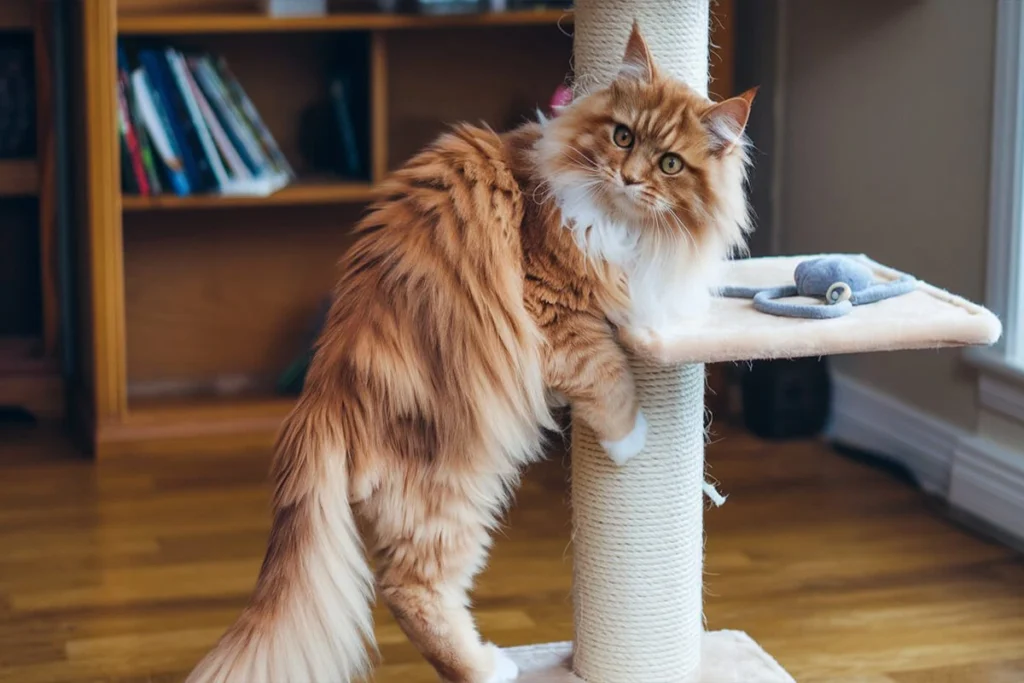
Maine Coon mixes also provide a great alternative. Many mixed-breed cats inherit the Maine Coon’s large size, fluffy coat, and friendly personality, but they cost much less. You can find Maine Coon mixes in shelters for $50 to $300.
Adopting an older or mixed Maine Coon offers several benefits:
- Lower adoption fees: Adult cats and mixes cost significantly less than purebred kittens.
- Fewer health uncertainties: Older cats have established health records, so you know what to expect.
- Easier temperament assessment: Their personality is already developed, making it easier to find a cat that fits your home.
Choosing an older or mixed Maine Coon allows you to experience the breed’s unique charm without the high cost of a pedigree kitten. Whether you adopt or buy, focusing on a cat’s health and temperament will ensure you bring home a wonderful companion.
Conclusion
The Maine Coon cat price varies widely depending on factors like breeder reputation, pedigree, and location. Purebred Maine Coon kittens from reputable breeders typically range from $1,000 to $4,000, while adoption from shelters or rescue organizations costs between $100 and $500. Those looking for a more affordable option should consider older Maine Coons or Maine Coon mixes, which can still provide the breed’s signature traits at a lower price.
Beyond the Maine Coon cat price, potential owners must budget for long-term care expenses, including veterinary check-ups, high-quality food, grooming, and pet insurance. Maine Coons are large cats with specific dietary and health needs, which can increase monthly expenses. Additionally, owners who travel frequently should factor in the cost of boarding facilities or pet sitters.
To find the best Maine Coon cat price, it’s essential to research reputable breeders, explore adoption centers, and consider alternative options like retired breeding cats. Avoid backyard breeders and pet stores that may offer lower prices but often lack proper health screenings and ethical breeding practices. Investing in a healthy, well-socialized Maine Coon will save money on potential medical issues in the future.
While the Maine Coon cat price may seem high, their affectionate nature, playful personality, and strong bond with their owners make them a rewarding companion. Whether purchasing from a breeder or adopting, ensuring that you can provide a safe, healthy, and enriching environment is the key to a happy life with your Maine Coon. By carefully considering all costs, you can make an informed decision and enjoy the company of this magnificent breed for years to come.
Read More About The Maine Coon Cat Breed Here.
Pick The Cutest Name for your Cat From our Top 20 Cute Cat Names Here.
Find The Best Care Tips For All Different Cats From HERE.
Looking For Some Good stuff for your Pet? Look no Further and pay Pet MD Official a Visit.
